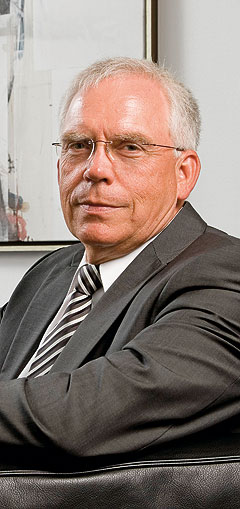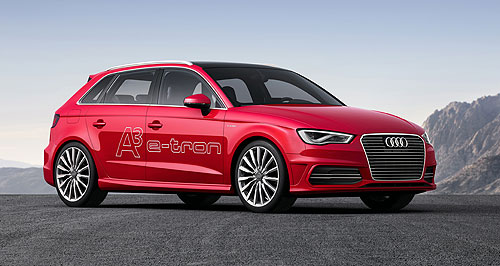News - AudiAudi puts faith in plug-in hybrids – for nowPlug-in: The A3 e-tron is a sign of the times for Audi until it moves into EVs and potentially hydrogen cars next decade. Slow-moving battery advances push Audi to stick to petrol-electric hybrid future24 Sep 2013 By MIKE COSTELLO in FRANKFURT AUDI says it will steer much of its research and development muscle towards plug-in hybrids until battery technology for electric vehicles can significantly extend range, board member for technical development, Ulrich Hackenberg, says. Speaking with GoAuto at the recent Frankfurt motor show, Dr Hackenberg said the Ingolstadt marque was focusing on plug-in petrol-electric vehicles such as the A3 e-tron because it could take up to 10 years until batteries allowed regular EVs to have “normal mobility”. “There will be improvement with batteries with the current technology of maybe 20 per cent, but to make a big step, to maybe double it, you need another electrochemical and that will take time,” he said. “That’s the reason why I think we need a bridging technology.” This stance in in contrast to Audi parent company Volkswagen, which is branching into the pure EV market with the e-Up and e-Golf, compact vehicles designed for megacities and fleets in Europe and China, and has expressed its intention to eclipse Renault, Nissan, Tesla and BMW as a world EV leader by 2018. Plug-in vehicles, such as the e-tron, pair a lithium-ion battery with a small petrol engine that acts as a back-up generator. The A3 can be driven for up to 50km in pure electric mode, but can travel around 600km with the engine activated, killing so-called “range anxiety”.  Left: Ulrich Hackenberg. Left: Ulrich Hackenberg.It was this that made plug-in tech the desirable option for now, said Dr Hackenberg, although the company was well placed to react to any technological breakthrough in the coming years. Two of the most likely future drive mechanisms for Audi cars are EVs -- once battery energy densities improve -- and hydrogen fuel cells: a technology being pursued by the likes of Daimler and Hyundai with vigour that counts water as its only emission. Audi began testing a hydrogen version of its A7 limousine in August, although Dr Hackenberg stressed this mode of propulsion was “not a key topic of communication”, stating the difficulty in cooling the gas to make it a liquid for transportation, and shortfalls in basic infrastructure. “What we are doing is to be in the line with state of the art, we have hydrogen cars in testing, studies, but it’s not a peak technology for us,” he said. “For me it’s a competition between hydrogen technology and battery technology because at the end of the day both are electric drives, and it’s only a matter of how you store the energy. “The problem with the batteries is you need a lot of them to get a sufficient range. Normal mobility for me is 400-500km, not less… and so we have to improve the batteries, and that takes time.” Dr Hackenberg’s statement comes despite at least one EV, the Tesla Model S premium grand tourer, already being available with a circa-500km range. However, most mainstream EVs of comparable size and price to the A3 e-tron, such as the Nissan Leaf, have ranges closer to 200km. “The next step for maybe doubling the range in this category I think, we meed maybe 10 years, because you need the electrochemical knowledge, and you have to bring it into production,” said Dr Hackenberg. “… So for me, both EV and hydrogen are using a lot of time, so it’s a question of how fast they move, it’s a reason why we are looking for both. We are seeing which one will be the fastest and we can react, because our cars will be ready for both technologies. Audi will be ready because of its MQB product architectures, developed by Dr Hackenberg in his time at Volkswagen. MBQ is a platform that can accommodate a range of drivetrains and battery cells, having been designed for alternate-fuel use right from the get-go.  Read more |
Click to shareAudi articlesResearch Audi Motor industry news |
















Facebook Twitter Instagram